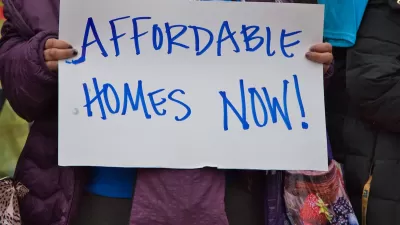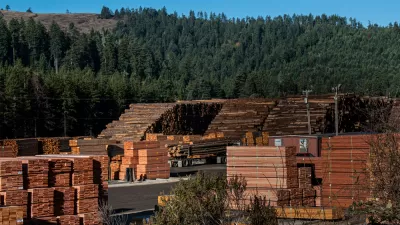One common argument against building new housing in high cost cities is that people priced out of those cities can always move somewhere cheaper. This post responds to that claim.

In response to public concern about high housing costs, people my age often suggest that people should stop complaining about high housing costs and move to someplace cheap. For example, one commentator I generally admire writes: "Someone struggling to live in San Francisco can move to Brainerd -- or Cincinnati or Louisville or Buffalo or even Detroit -- and enjoy a very nice life." In context, this sentence was written as advice for individuals—and for some individuals, I am sure it is excellent advice.
But it won’t work for quite a few people. Why not?
First, the "move to Buffalo" claim is based on the assumption that Americans can move anyplace, get a job, and build a comfortable life. But this certainly has never been true for me: I have lived in 14 cities since graduating from law school, and most of my moves were involuntary in the sense that I had one offer and had to go where the offer was. For example, when I graduated from law school I had one offer (in Washington, D.C.). Even though I was quite happy to go to Washington, if that offer had been in, say,Grand Rapids, I would have moved to Grand Rapids. I suspect my situation is pretty common in my profession: law firms tend to hire people with local ties, so very few law graduates can easily choose where to live.
Second, even people who can get a job anywhere have all sorts of good reasons not to live in small towns: for example, if you belong to a minority religion, you probably aren’t going to want to live in a place too small to support a religious community of your type. If you are single, you probably are going to prefer a larger city with lots of singles. In other words, moving to Anytown, USA is fine if you are white, a mainstream Protestant, easily employable, and married to a spouse with similar characteristics. Otherwise, maybe not.
More importantly, even if moving to a cheaper city is good for the individual, it might create harmful externalities for the nation (if not the planet). This is so for three reasons. First, if high-cost places are the most productive places, national economic and cultural growth might be hampered if gifted people are forced into small towns. For example, suppose that Expensive City X has the nation’s best medical research universities, but Young Dr. Y, a gifted young researcher, becomes a small-town general practitioner in order to avoid housing costs. Dr. Y could have found a cure for cancer, but instead was diverted from medical research by X’s high rents. To use a more concrete example: would Steve Jobs or Bill Gates have been as productive in rural North Dakota as they were in coastal metro areas?
Second, to the extent that high-cost cities are more walkable and transit-oriented*, helping young people stay in those cities is good for the environment because these people will drive less and use public transit more than if they moved to, say, Las Vegas or Houston. Perhaps in an ideal world, people priced out of San Francisco would all move to a walkable Rust Belt city, thus bringing such cities back to their former glory. But this hope is based on the assumption that the urban Rust Belt will absorb most people priced out of high-cost cities. But even the most casual look at a World Almanac shows that such cities continue to lose population; the highest-growth cities are generally automobile-oriented cities in the South and West like Orlando and Las Vegas. And people who move to Orlando or a similar city will create lots of greenhouse gas emissions by driving (because Orlando is so car-dependent) and through high amounts of electricity use (because it takes a lot of air conditioning to be comfy in Florida).
Third, even if Americans priced out of high cost cities do move to Rust Belt cities en masse, the residents of those cities might not be too happy about it. If, for example, 100,000 people moved to Buffalo tomorrow, the demand for housing would increase, possibly causing higher rents and gentrification. When I searched for "Buffalo" and "gentrification" I found over 200,000 Google hits—a fact suggesting that even now there is plenty of gentrification-phobia there. Our hypothetical population increase would lead to even more gentrification-phobia or even actual gentrification, thus increasing public support for zoning policies designed to exclude new housing, thus causing rents to increase, thus causing Buffalo to have the same problems as San Francisco or San Diego. In other words, using residential mobility as an excuse for restrictive zoning is a "beggar thy neighbor" policy—it exports demand for housing and the resulting price shocks from one city to another, rather than mitigating the problem.
*Though not all of them are. For example, high-cost San Diego is almost as automobile-dependent as any other city in the south or west.

Alabama: Trump Terminates Settlements for Black Communities Harmed By Raw Sewage
Trump deemed the landmark civil rights agreement “illegal DEI and environmental justice policy.”

Planetizen Federal Action Tracker
A weekly monitor of how Trump’s orders and actions are impacting planners and planning in America.

The 120 Year Old Tiny Home Villages That Sheltered San Francisco’s Earthquake Refugees
More than a century ago, San Francisco mobilized to house thousands of residents displaced by the 1906 earthquake. Could their strategy offer a model for the present?

In Both Crashes and Crime, Public Transportation is Far Safer than Driving
Contrary to popular assumptions, public transportation has far lower crash and crime rates than automobile travel. For safer communities, improve and encourage transit travel.

Report: Zoning Reforms Should Complement Nashville’s Ambitious Transit Plan
Without reform, restrictive zoning codes will limit the impact of the city’s planned transit expansion and could exclude some of the residents who depend on transit the most.

Judge Orders Release of Frozen IRA, IIJA Funding
The decision is a victory for environmental groups who charged that freezing funds for critical infrastructure and disaster response programs caused “real and irreparable harm” to communities.
Urban Design for Planners 1: Software Tools
This six-course series explores essential urban design concepts using open source software and equips planners with the tools they need to participate fully in the urban design process.
Planning for Universal Design
Learn the tools for implementing Universal Design in planning regulations.
Clanton & Associates, Inc.
Jessamine County Fiscal Court
Institute for Housing and Urban Development Studies (IHS)
City of Grandview
Harvard GSD Executive Education
Toledo-Lucas County Plan Commissions
Salt Lake City
NYU Wagner Graduate School of Public Service






























